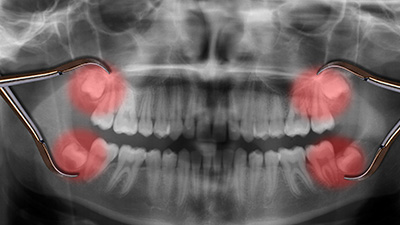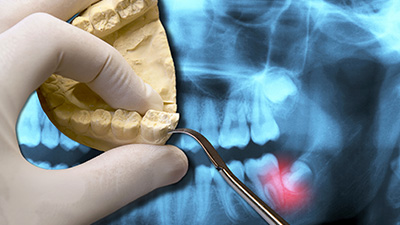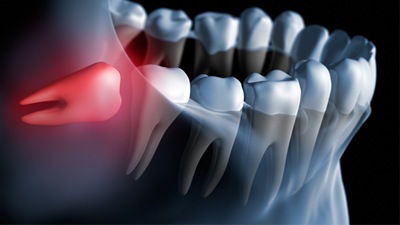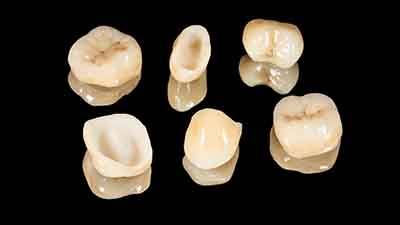Wisdom Teeth Removals
Extractions Performed In-House

At 21st Century Dental of Irving, we always plan your dental care with your long-term oral health in mind. A great example is wisdom tooth extractions in Irving, which only have to be done once, but help you maintain a healthy smile for life. Our team of practitioners includes a dentist who has the experience and advanced training to handle the cases with ease and make the procedure comfortable from start to finish. If you have wisdom teeth and would like to schedule a consultation, don’t hesitate to contact us!
Why Choose 21st Century Dental of Irving for Wisdom Tooth Extractions?
- Oral Surgeon Available In-Office
- Effective Sedation Techniques Available
- Maximized Comfort & Relaxation
What Are Wisdom Teeth?

“Wisdom teeth” are simply the last set of permanent molars that come in. The first set erupts about age 6, the second set around age 12, and the third set (the wisdom teeth) usually appear in the late teens to early twenties. This is the age when people have a little more life experience and can (presumably) be considered wiser than they were in childhood.
Why Do Wisdom Teeth Need To Be Removed?

Long ago, people had larger jaws and needed an extra set of molars to chew tough and fibrous foods. Now, with a softer diet and modern oral hygiene practices, we simply don’t need our wisdom teeth anymore. Not to mention that our jaws have become smaller, so most of us don’t have enough room for them. This leads to impaction (where they come in sideways or at an angle) or poor oral hygiene since these teeth are too far back to reach with a toothbrush and floss.
That’s why, even if your wisdom teeth aren’t causing problems now, there’s a good chance they will later on. Having them taken out is a great way to prevent serious problems down the road such as:
- Crowding or alignment issues
- Cysts or infections in the jawbone
- Sinus problems
- Damage to other teeth
- Severely inflamed, painful gums
How Are Wisdom Teeth Extracted?

First and most importantly, we work closely with an anesthesiologist to make sure we achieve 100% pain control and relaxation. We have four people in the room for every procedure: the anesthesiologist, the surgical doctor, and both a dental and anesthesia assistant.
After you are IV sedated but still breathing on your own, you will then also be numbed so there is no chance of experiencing any pain. Now for the teeth - this depends on how the wisdom teeth have come in. If they’ve come in straight and can be fully seen above the gumline, the procedure is more straightforward. In these cases, we can simply use special tools to loosen and remove the teeth without the need to make any incisions. In some people, however, the wisdom teeth are impacted or haven’t fully come through the gums. These cases require a surgical extraction in which we’ll make incisions in the gums to access and remove the teeth.
After our doctor has evaluated your needs during a consultation, we’ll be able to tell you more about what you can expect. We’ll also answer any questions you have and discuss our wide range of sedation options to make sure the procedure is comfortable.
What Is the Recovery Process Like?

Our team at 21st Century Dental of Irving will take great care of you from beginning to end, which includes making sure you recover well. We’ll go over your aftercare instructions in detail at your procedure, but here are the basics:
- Arrange for a friend or family member to bring you to and from your appointment and take several days off work or school to fully rest and recover.
- Before your procedure, we’ll discuss your options for pain medication. Be sure to take it as directed and call us right away if you have any questions or concerns.
- Keep clean gauze over the extraction sites to absorb any bleeding, and change them out as necessary for the first couple of days.
- Eat soft foods for 3-4 days and chew on the opposite side of your mouth.
- Avoiding hot or carbonated beverages and don’t smoke, spit, or use a straw while the area is healing.
- Keeping your teeth and gums clean will help you heal properly, but do so very carefully. We’ll review the best oral hygiene practices at your visit.
How can wisdom teeth help in the future?

Did you know that your wisdom teeth—and all your teeth for that matter—contain cells that can help your body heal? Adult stem cells are a great resource that improve the odds of successful treatment for many serious medication conditions. When we remove wisdom teeth, the stem cells can be stored and preserved for later. Then, if necessary, they can be used in treatments that are basically guaranteed not to be rejected by your body because these cells are an exact match for you. Stem cell banking is just another way our experts at 21st Century Dental of Irving are showing our dedication to your well-being!
Learn More About Stem Cell Banking
Understanding the Cost of Wisdom Tooth Extractions

Every smile is different, so the cost of one patient’s wisdom tooth extraction won’t be the same as another's. At 21st Century Dental of Irving, we tailor our treatments to the individual needs of our patients, offering multiple options to make their experiences less stressful. We also believe that pricing should be transparent, especially when dealing with a treatment like wisdom tooth extraction. So, read more below to learn how we estimate the cost of your procedure so you can be informed before your consultation.
Factors That Can Impact the Cost of Wisdom Tooth Extractions

There are multiple reasons why the price of a wisdom tooth extraction can fluctuate. At your initial consultation, your dentist will go over these factors with you to give you a more accurate cost estimate:
- The Number of Teeth You Need Removed: If you need more than one of your wisdom teeth extracted at a time, the procedure time increases, necessitating a higher cost.
- Whether Your Teeth Are Impacted: There’s a big difference between a normal wisdom tooth removal and an extraction for impacted ones. Impacted wisdom teeth may require oral surgery to remove properly.
- The Type of Sedation Used: To make your experience as stress-free as possible, we offer multiple sedation dentistry options including nitrous oxide, oral conscious sedation, IV drip, and NuCalm. Depending on the type of procedure you need, a different level of sedation might be advised, adding to the price of your treatment overall.
- Who Performs Your Procedure: While our team can handle almost any extraction ourselves, in the rare case you need to be referred to a specialist, you could end up paying more for their expertise.
Does Dental Insurance Cover Wisdom Tooth Extractions?

While it is possible that your dental insurance provides coverage for wisdom tooth extraction, it’s not a guarantee. The details of various plans differ from provider to provider, making it difficult to determine based on your insurance company alone. If you need help figuring out your coverage specifications, our staff will be happy to help you parse the information. They can also file any claims you may need on your behalf, taking one more thing off your mental plate!
Other Options for Making Wisdom Tooth Extractions Affordable

While dental insurance can make your wisdom tooth extraction more affordable, we understand that not every patient has access to it. This is why we offer affordable financing options through CareCredit and Lending Club. These services allow you to get the funding you need for your treatment now and pay off your balance over time.
Wisdom Tooth Extractions FAQs
Does Everyone Have Wisdom Teeth?
Most people have all four wisdom teeth. (These chompers usually emerge between the ages of 17 to 21.) However, there are those missing at least one. Yet others don’t have any at all.
Current research supports these conclusions. In 2015, a study published by the Dental Research Journal made a rough estimate: 5-37% of all people lack one or more wisdom teeth. As for the reason, scholars remain uncertain. Genetics may play a role, as a parent without wisdom teeth may have a child missing them as well.
Of course, your wisdom teeth may not be visible. (Perhaps they just haven’t erupted.) So, a dental X-ray is the best way to confirm how many you have.
How Do You Make Wisdom Teeth Pain Go Away?
The only lasting cure for aching wisdom teeth is to have them pulled. Still, there are home remedies you can try in the meantime. These include:
- A Cold Compress – Wrap a towel around an ice pack and apply it to the outside of your cheek for no more than 20 minutes at a time.
- Medication – Take over-the-counter pain relievers as directed on the label. (Don’t apply aspirin to the aching area, though; it’ll worsen your pain.)
- Numbing Gel – Use an oral numbing gel that contains benzocaine. In reality, the latter ingredient soothes gums irritated by impacted wisdom teeth.
- Saltwater Rinse – Rinse your mouth with a saltwater solution (one or two teaspoons of salt dissolved in an eight-ounce glass of water). Swish it for about one minute.
How Long Does Wisdom Tooth Surgery Take?
It usually takes a dentist 20 minutes to extract a wisdom tooth. Therefore, removing all four may require up to 90 minutes. That said, the exact timing varies by patient. It’ll depend on factors like the tooth’s location, position, whether it’s impacted, etc. (Our dentists can give you an estimate at your consultation.)
Whatever the procedure’s exact timeline, rest assured that it won’t feel long. You’ll likely be sedated for the entire treatment. As such, you’ll barely notice any time has passed once it’s done.
Should Wisdom Teeth Be Removed Before Braces?
Wisdom teeth don’t have to be removed before braces. However, your dentist or orthodontist may suggest the option. There are benefits to pulling these chompers ahead of time.
You see, wisdom teeth can disrupt alignment work. By pushing against your other pearly whites, they could extend or ruin your braces treatment. Yet later, they could misalign your grin even if you wear a retainer every night.
In contrast, pulling the wisdom teeth first makes things simpler. It gives your orthodontist a “ clean slate” to work with, leading to more permanent braces results. If you’ve already had braces before the wisdom teeth emerge, though, you can compensate. Just get the chompers removed as soon as possible to preserve your results.
Why Do We Have Wisdom Teeth?
While today wisdom teeth seem like more trouble than they’re worth, believe it or not they once served a valuable purpose to our early human ancestors. Because they survived on a diet of raw foods (including raw meats, berries, nuts, roots, and leaves) and didn’t have utensils or modern cooking techniques, early man’s teeth were exposed to more wear and deterioration than ours are. Thus, these teeth needed to be stronger than ours do, and their jaws needed to be big enough to accommodate them. Furthermore, because of this strain, the back molars were often worn or broken by the late teens, and the wisdom teeth showed up right in time to replace them.
Nowadays, however, our smaller jaws and softer diet don’t require third molars, but we still get them. Unfortunately, this can cause a variety of problems from crowding to impaction, and typically can only be corrected by extraction.
What’s the Best Age to Get Wisdom Teeth Removed?
While there is no specific age at which you should have your wisdom teeth removed, it is generally recommended they are extracted in early adulthood. While they can still be removed later in life, the procedure and recovery are typically much easier when you’re younger. This is because as you age, the roots of your teeth grow longer and more embedded in your jaw, making the procedure a bit more complicated in older patients. This can also make the recovery period longer as well. Scheduling an extraction is usually easier for patients who are still in high school and can plan the procedure around school breaks and long weekends.
Should your dentist suggest wisdom tooth removal, it is better to do it sooner rather than later to avoid dangerous complications like impaction, decay, cysts, and damage to nearby teeth.
Should Wisdom Teeth Be Removed If They Don’t Hurt?
Even though your wisdom teeth may not hurt yet, they could become problematic if they aren’t removed eventually. While some patients are fortunate in that theirs never cause issues, wisdom teeth can frequently become painful or infected and cause a variety of other oral health concerns if not extracted.
They should only be extracted if your dentist recommends it. Your dentist is qualified to evaluate whether your wisdom teeth are currently putting your oral health at risk, or if they could in the future. Once your dentist has recommended extraction, it is a good idea to schedule the procedure sooner than later, even if they are not yet causing any pain. If left in place, they could cause problems such as:
- Infection: Because of their location, your wisdom teeth can easily trap food debris and bacteria in your mouth. They can also be very difficult to reach with your toothbrush and floss, making it easier for them to become infected or decayed. This can put your other teeth and your gums at risk, too.
- Jaw pain and headaches: Because wisdom teeth can sometimes come in at odd angles, they can often exert pressure on your other teeth, causing headaches and jaw pain.
- Cysts: Wisdom teeth that aren’t removed quickly enough could develop a fluid sac around them, which can grow into a cyst that may cause permanent damage to your surrounding teeth, gums, and jawbone.
- Orthodontic issues: When your wisdom teeth press against your other teeth, it could cause them to become misaligned, and in severe cases may require you to get braces to correct these issues later.
When Can I Use a Straw After Wisdom Teeth Removal?
You may have heard that you shouldn’t drink from a straw following wisdom tooth removal. That’s because when you drink through a straw, it creates a suction force that can dislodge the blood socket forming over your extraction site. This can cause a painful condition known as dry socket.
While the exact amount of time that must pass until you can use a straw again varies depending on your age, medical history, rate of healing and other factors, you should be prepared to wait at least two to three days post-op. Your dentist will give you a more precise, personalized recommendation based on your individual circumstances.
